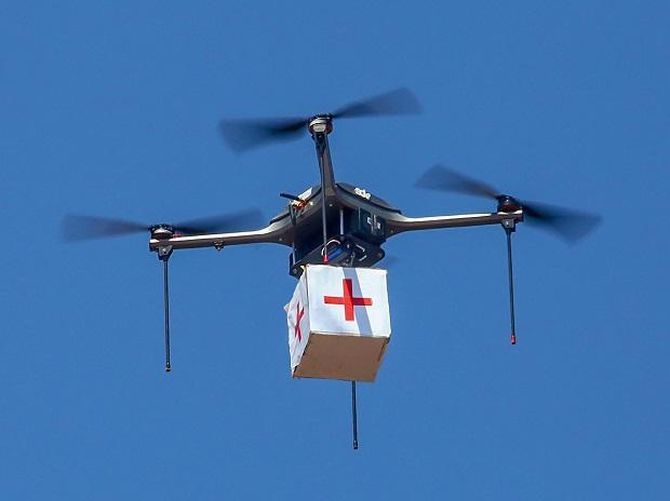Maharashtra govt, California-based Zipline to launch the automated delivery service funded by Serum Institute.
This new emergency service is a great solution to deliver vaccines, blood and other lifesaving products instantly when time is of essence.

After African countries like Ghana and Rwanda, now the Maharashtra government is also planning to deliver emergency medicines through drones.
The service, expected to be launched in early 2020, will be operated by California-based automated logistics firm Zipline.
Announcing the partnership with Zipline, the world's first and only national-scale drone delivery service, the state government said the initiative will be supported through a grant from Serum Institute of India (SII), a leading vaccine manufacturer.
An autonomous delivery drone-based logistics network will be established by Zipline.
A total of 10 distribution centres are planned across Maharashtra in phases over the next few years.
The new initiative is a part of the state government's vision of using drone delivery to establish universal seven-days-a-week access to lifesaving and critical medicines which will reach to its 120 million citizens over the coming years.
Zipline drones will make on-demand and emergency deliveries of blood products, vaccines and life-saving medications.
In the first phase, two distribution centres located near Pune and Nandurbar will be established to service public health facilities in those regions beginning in early 2020.
The operations in Pune and Nandurbar will be financed through a grant from SII.
Future distribution centres will be financed by the government of Maharashtra and other private and philanthropic partners, the state government statement here said.
To increase access and reduce medicial waste, key stock of blood products, vaccines and life-saving medications will be stored at distribution centres for just-in-time delivery. Health workers will place orders by text message or call and promptly receive their deliveries in 30 minutes on average.
“The drones both take off from and land at Zipline's distribution centres, requiring no additional infrastructure or manpower at the clinics they serve.
"They fly autonomously and can carry 1.8 kilos of cargo, cruising at 110 kilometres an hour, and have a round-trip range of 160 kilometres - even in high speed winds and rain,” the statement said.
Each of the two distribution centres in Maharashtra will cover a delivery area of more than 20,000 square km.
They will collectively be capable of serving up to 20 million people.
Deliveries are made from the sky, with the drone descending to a safe height above the ground and releasing a box of medicine by parachute to a designated spot at the health centres it serves.
“Maharashtra has one of the best healthcare systems in India.
This new emergency service is a great solution to deliver vaccines, blood and other lifesaving products instantly when time is of essence.
"It will help ensure that millions of people in Maharashtra will always get the care they need,” said Maharashtra Chief Minister Devendra Fadnavis.
Zipline CEO Keller Rinaudo said millions of people die every year across the world because they cannot get the medicine they need when they need it.
“Instant drone delivery can help solve that problem,” he added.
The Goldman Sachs, Sequoia Capital, Katalyst Ventures, Temasek, Toyota Tsusho Corporation, Stanford University backed firm's goal is to serve 700 million people across the world in the next five years.
The firm's operations started in October of 2016 to deliver blood to 21 hospitals in Rwanda.
Since then, the service has expanded nationwide covering most of the country's 12 million population by drone delivery of medical products at 450 facilities.
In April 2019, Zipline partnered with the government of Ghana to launch the first of four distribution centres that will serve 2,000 health facilities and a population of 12 million people across the country.
SII’s CEO Adar Poonawalla felt that the initiative would create deeper impact and extend the immunisation cover in the state.
Photograph: PTI Photo












 © 2025
© 2025